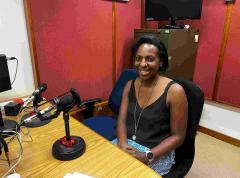簡介
Listen to #Hashtag Hong Kong every Sunday morning at 8.15
Focussing on issues affecting civil society, we'll hear from representatives of NGOs, associations, statutory bodies, and non-profit groups.
(Sundays 8.15am - 8.25am)
最新

Christina Y W Chua - Co-Founder & Chief Executive Officer at The CEO Foundation
Dear Parents,
As we navigate the complexities of raising children in today's fast-paced world, it's essential to stay informed about the support systems available to promote their mental well-being. Since its establishment in 2000, The CEO Foundation has been committed to enhancing lives in Hong Kong and China, particularly through mental wellness initiatives. In 2018, we proudly launched a new endeavor focusing on Animal-Assisted Service (AAS), which harnesses the unique bond between humans and dogs to foster emotional resilience and personal growth.
Our therapy dogs, known as Social Work Canines, are more than just pets; they are pivotal partners in providing support and enhancing the emotional experience of our beneficiaries. These specially screened and trained dogs work alongside their owners and bonded handlers, engaging with diverse groups, including children, teens, and the elderly. Our initiative aims to create a safe and nurturing environment where individuals can find comfort and companionship during their most challenging moments.
In recent years, our community has faced significant mental health challenges, particularly among primary and secondary school students. Research from the last decade indicates a concerning trend in the mental wellness of our youth. According to data collected by the Hong Kong Student Mental Health Survey, approximately 24% of primary school students reported experiencing symptoms of anxiety, while this number rose to about 30% among secondary school students. This spike reflects the mounting pressures students face from academic expectations, peer interactions, and social media influences.
Perhaps even more troubling is the report to suicidal ideation among students. Over the last decade, the number of reported suicide cases among adolescents has increased, with the Hong Kong Mental Health Association noting a rise of 20% in the past five years alone. Moreover, data reveals that approximately 10% of students have considered taking their lives during their formative years, highlighting the urgent need for proactive measures to bolster mental health support.
Among youth, Social Anxiety Disorder (SAD) has become increasingly prevalent. Recent studies show that around 15% of adolescents in Hong Kong exhibit signs of SAD, creating barriers to healthy peer relationships and academic success. Additionally, conditions such as bipolar disorder and depression are affecting students at alarming rates, with recent statistics indicating that nearly 25,000 young people receive treatment for psychosomatic disorders each year.
In response to this escalating mental health crisis, The CEO Foundation initiated the HI (Human-Animal Interactive) Partner Program, a pioneering approach that utilizes the therapeutic benefits of AAS. Through our program, we aim to provide a multi-faceted support system for individuals across all age groups.
The presence of therapy dogs can alleviate anxiety and promote emotional healing in children and teens. Studies show that interactions with Social Work Canines can lead to lowered stress levels, increased feelings of happiness, and enhanced social interactions. These dogs offer kids a loving, non-judgmental source of comfort, allowing them to express themselves without fear.
For the elderly, the companionship of therapy dogs has proven to enhance their quality of life by reducing feelings of loneliness and providing motivation for physical activities. The HI Partner Program ensures that individuals from diverse backgrounds can access the mental health support they need through loving interaction with our Social Work Canines.
As we move forward, we invite you to partner with us in this important journey. Let’s come together as a community and advocate for mental wellness among our children and youth. By fostering connections through the amazing bond between humans and animals, we can help reduce anxiety, improve emotional regulation, and ultimately create a brighter future for our next generation.
We look forward to sharing more about the HI Partner Program and how you can get involved in supporting our mission to enhance mental wellness throughout Hong Kong.
Lastly, I would like to dedicate a song "You've got a friend" by Carole King, thanks and enjoy.






















